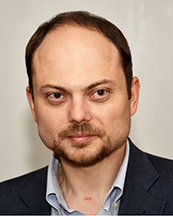When a group of officers burst into my cell at 3 a.m. on July 28 and told me to get up and get ready in 10 minutes, my first thought was that I was going to be led out to be executed.
The scenario seemed all too plausible because of a bizarre episode earlier that week, when a senior prison official walked me to his office and told me to sign a pardon request addressed to Vladimir Putin, complete with an admission of “guilt.”
I told him I would never ask Putin for anything — least of all for a “pardon” — because I consider him to be a usurper and a murderer, not a legitimate president; and because the real criminals are those who have unleashed the war in Ukraine, not those of us who are speaking out against it.
The official didn’t seem pleased and requested that I put it all in writing. And that I gladly did, adding that I hope to see Putin one day put on trial for all his crimes. That was my last interaction with prison officials in Omsk before the unscheduled wake-up on Sunday.
But instead of the nearby wood, the prison convoy drove me to the airport and escorted me, in handcuffs, onto a plane bound for Moscow. Last year, it took three weeks in cramped “Stolypin carriages” to get me from Moscow to Siberia; the return trip was only three hours. So started a journey more fit for a Hollywood action movie than for the reality of today’s Russia; one that still feels as unreal today as it did while it unfolded.
Our destination was Lefortovo, the infamous KGB prison that once held Alexander Solzhenitsyn, Vladimir Bukovsky, Natan Sharansky and other opponents of the Soviet regime. After my prison in Omsk, it felt like a resort: no time-limits on reading or writing; no prohibition on lying down on the bed; no constant reprimands for imagined “violations.”

What was uncomfortable was the uncertainty: no one explained why I was in Lefortovo or how long I would stay there. When I asked a prison captain to notify my family and lawyers that I had been transferred to Moscow, he smiled at me: “You are not in Moscow, Vladimir Vladimirovich. You are still in Omsk.” This didn’t exactly clear things up.
Since the exchange, many journalists have asked when I first knew it was coming. The answer is: only on the morning of Aug. 1, shortly before it happened. To be precise, at the moment balaclava-wearing operatives of an FSB special unit escorted me onto a bus parked in Lefortovo’s internal courtyard, where I saw friends and fellow political prisoners, including opposition politician Ilya Yashin, human rights activist Oleg Orlov, and artist Alexandra Skochilenko — all jailed for their opposition to the war in Ukraine. There could only be one reason for us all to be on the same bus.
The movie continued, too quick for the human mind to process — especially after months of solitary confinement. A whirlwind ride through Moscow with a police escort; a Tupolev jet readied in the government wing of Vnukovo airport; the same FSB operatives sitting next to every prisoner on our flight to Turkey.
The exchange itself took less than an hour, with Russian prisoners boarded onto one set of buses, and those Putin was getting from the West in return — his spies, hackers and murderers — walking from another bus onto the Russian plane.
“Welcome to freedom,” were the first words from Jens Plötner, the German chancellor’s national security adviser, who greeted us in the terminal. And just when I thought things couldn’t get any more surreal, a diplomat from the U.S. Embassy approached me with a cellphone and told me that the president of the United States was on the line. Alongside him, I heard the voices of my wife and children whom I had been forbidden from calling from prison for more than two years.
I don’t have the words, in any language, to describe the feeling.
The exchange in Ankara was historic in many ways. The largest East-West prisoner swap since the Cold War, it was only the fifth in history that freed not just Western hostages but also political prisoners from Soviet or Russian captivity.
It is one thing to speak about freedom and human rights — many Western leaders say the words. It’s quite another to actually do something to protect them. Few things should be more important for a democracy than human life; and with this exchange, the U.S. and German governments have saved 16 lives from the hell of Putin’s Gulag. Whatever else President Joe Biden and German Chancellor Olaf Scholz will be remembered for years from now, they will be remembered for this.
But so many others are still left behind. Today’s Russia holds more than 1,000 political prisoners, many of them for opposing the war in Ukraine. They still fold their bunks at 5 a.m.; still walk around in a circle in small roof-covered prison courtyards; still cannot speak to their loved ones. Many are in dire health condition, and their plight is becoming urgent.
The exchange on Aug. 1 has shown that the free world cares and that, contrary to stereotype, there is still room for decency and values in international politics. We must not let this become an exception — and we must not rest until the others who are unjustly imprisoned by Putin’s dictatorship are home and reunited with their families, too.







